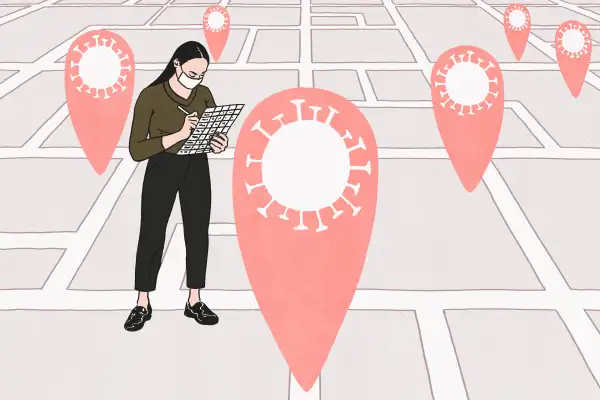Coronavirus ‘Contact Tracer’ is One of the Most In-Demand Jobs Right Now. Here’s How to Get Hired

States across the country are hiring tens of thousands of contact tracers to stop the spread of COVID-19.
It’s important work: Contact tracers help infected Americans recall the names of everyone they’ve recently come into contact with, and then track those individuals down to avert the disease’s path of infection.
Emily Gurley, a Johns Hopkins epidemiologist and the lead instructor of a free online course on the fundamentals of contact tracing, calls the people who fill these roles “part detective, part therapist, and part social worker.”
Thinking of applying for a contact tracing job? Here’s everything you need to know.
What is contact tracing?
In a nutshell, contact tracing is the process of identifying people who have come into close contact with someone who recently tested positive for COVID-19, based on results from city and state health departments, with the intent to test or monitor them for infection.
“The goal is to stop the spread of COVID-19 by finding and isolating cases,” says Steve Waters, founder and CEO of CONTRACE, an online database of over 50,000 qualified contact tracer applicants.
Contact tracing isn’t new, according to Gurley. “It’s been used to contain the spread of diseases like HIV and Ebola,” she says, “but for COVID-19 we have to do contact tracing at a scale and pace much faster than we’ve ever experienced, since the disease moves very fast and people are infectious before they have symptoms.”
In addition to tracking down people who may have come into contact with the Coronavirus, contact tracers help infected individuals secure critical support services like housing, food, and medicine.
“Contact tracers spend their day talking to people who are in difficult situations; either people who have been diagnosed with COVID-19 or people who have been exposed to someone with COVID-19,” Gurley says. “Both of those situations are scary.”
What are the job requirements?
Every state requires different qualifications for contact tracing jobs. Some states require a high school diploma or GED, while other states may also require job experience in health promotion or disease intervention.
For instance, in Georgia, a contact tracing job with the state's Department of Public Health requires at least a high school diploma. In New York City, a basic contact tracing job requires a bachelor's degree with 12 semester credits in health education, or a high school diploma with at least five years of experience in health promotion or disease prevention.
What skills do I need?
Contact tracing isn’t for everyone. As Gurley puts it: “You need to be a good listener, you need to be able to build rapport with people and, of course, you need to be knowledgeable about the disease.”
Empathy and good verbal communication skills are crucial. “The job involves talking with people all day,” Waters says. So people who have worked in call centers or customer service may be well suited for contact tracing jobs.
The CDC says contact tracers must also be adept at locating patients and contacts who may be difficult to reach — or reluctant to engage in conversation. In other words: If you want to apply for this job, you need to be comfortable making a lot of phone calls, sending a lot of emails, and reaching out to a lot of strangers over social media.
Where can I find a contact tracing job?
To find opportunities in your area, check your local and state health department websites. Although most contact tracing jobs can be performed remotely from home, “the vast majority of contact tracers will be hired to work for the county or state they live in,” Waters says.
Contact tracing jobs are available throughout the country, but the bulk of the open roles are in areas that have been hit the hardest by COVID-19. New York Governor Andrew Cuomo recently announced plans to hire up to 17,000 tracers across the state as part of its reopening strategy. In California, Governor Gavin Newsom said the state plans to hire 10,000 contact tracers.
How much do contact tracers get paid?
Though compensation for contact tracing jobs can vary widely from state to state and county to county, Waters says most contact tracers earn between $17 and $25 an hour. Some states pay less — Georgia’s Department of Public Health, for one, is offering $15 per hour for full-time contact tracers.
Gurley says most contact tracing job openings are full-time jobs. “There is going to be an ongoing need for contact tracing for quite some time, so these are long-term job opportunities,” she says.
More from Money:
True or False: Ignoring the Census Could Cost You $5,000
Here's a State-by-State Breakdown of PPP Funding — And How Far it Went
How to Tell if a Job Offer is Secure in an Unstable Labor Market
